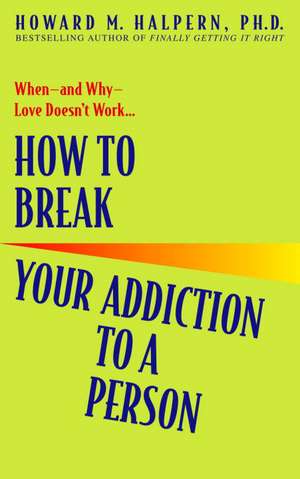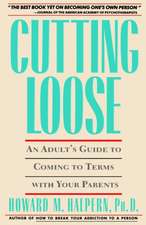How to Break Your Addiction to a Person
Autor Howard M. Halpernen Limba Engleză Paperback – 30 noi 2003
Are you unable to leave a love relationship even though it gives you more pain than joy? Your judgment and self-respect tell you to end it, but still, to your dismay, you hang on. You are addicted--to a person. Now there is an insightful, step-by-step guide to breaking that addiction--and surviving the split. Drawing on dozens of provocative case histories, psychotherapist Howard Helpern explains to you:
Why you can get addicted to a person.
Why and how you may try to deceive yourself. ("He really loves me, he just doesn't know how to show it.")
How you can recognize the symptoms of a bad relationship.
How to deal with the power moves and guilt trips your partner uses to hold you.
Why strong feelings of jealousy do not mean you are "in love."
How to get through the agonizing breakup period--without going back.
How not to get caught in such a painful relationship again.
From the Paperback edition.
Preț: 99.62 lei
Nou
Puncte Express: 149
Preț estimativ în valută:
19.06€ • 20.38$ • 15.89£
19.06€ • 20.38$ • 15.89£
Carte disponibilă
Livrare economică 27 martie-10 aprilie
Preluare comenzi: 021 569.72.76
Specificații
ISBN-13: 9780553382495
ISBN-10: 0553382497
Pagini: 272
Dimensiuni: 136 x 209 x 15 mm
Greutate: 0.21 kg
Ediția:Bantam Trade Pb.
Editura: Bantam
ISBN-10: 0553382497
Pagini: 272
Dimensiuni: 136 x 209 x 15 mm
Greutate: 0.21 kg
Ediția:Bantam Trade Pb.
Editura: Bantam
Notă biografică
Howard M. Halpern received his Ph.D. in clinical psychology from Columbia University in 1954. He taught at Columbia and other colleges and has been a consultant, clinical psychologist, and psychotherapist at several New York colleges and clinics. He was the codirector of the New York Student Consultation Center and is a past president of the American Academy of Psychotherapists.
Dr. Halpern has practiced psychotherapy in New York City for forty-eight years. His previous books include Cutting Loose: An Adult Guide to Coming to Terms with Your Parents and Finally Getting It Right. He also wrote a nationally syndicated newspaper column called "On Your Own". His appearances on national media include Donahue, The Today Show, 20/20, and CNN.
Dr. Halpern has practiced psychotherapy in New York City for forty-eight years. His previous books include Cutting Loose: An Adult Guide to Coming to Terms with Your Parents and Finally Getting It Right. He also wrote a nationally syndicated newspaper column called "On Your Own". His appearances on national media include Donahue, The Today Show, 20/20, and CNN.
Extras
1
Prisoner of Love?
Maybe the Surgeon General hasn't determined it yet, but staying in a bad relationship may be dangerous to your health. It can shake your self-esteem and destroy your self-confidence as surely as smoking can damage your lungs. When people say that their relationship with their partner--a lover or spouse--is killing them, it may be true. The tensions and chemical changes caused by stress can throw any of your organ systems out of kilter, can drain your energy, and lower your resistance to all manner of unfriendly bugs. And often it can drive one to the overuse of unhealthy escapes, such as alcohol, amphetamines, barbiturates, narcotics, tranquilizers, reckless pursuits, and even overt suicidal acts.
But even if there were no threat to your health, staying too long in a relationship that is deadening, or deadly, can cloud your life with frustration, anger, emptiness, and despair. You may have tried to improve it, to breathe life back into it, but you have found that your efforts have been futile--and demoralizing. You are certainly not alone. Many basically rational and practical people find that they are unable to leave a relationship even though they can see that it is bad for them. Their best judgment and their self-respect tell them to end it, but often, to their dismay, they hang on. They speak and act as if something were holding them back, as if their relationship was a prison and they were locked in. Friends and psychotherapists may have pointed out to them that in reality their "prison door" is wide open and that all they need do is step outside. And yet as desperately unhappy as they are, they hold back. Some of them approach the threshold, then hesitate. Some may make brief sallies outside, but quickly retreat to the safety of prison in relief and despair. Something in them wants out. Something in them knows that they were not meant to live this way. Yet people, in droves, choose to remain in their prisons, making no effort to change them--except, perhaps, to hang pretty curtains over the bars and paint the walls in decorator colors. They may end up dying in a corner of their cell without having really been alive for years.
Every day I listen to the struggles of men and women who feel imprisoned in unsatisfying relationships.
Alice: I'm slowly growing crazy with Burt. He's so cut off from his feelings and so unresponsive to me that I feel I'm with a robot. In the beginning he was kind of romantic, but now there's nothing coming from him but silence and disinterest. When I complain he says that's the way he is. Even though I'm so frustrated and miserable, I can't get myself to leave him. In fact, I get very frightened when I think about it seriously. . . .
Jason: Dee is irresponsible and selfish much of the time. She'll put me down before other people and sometimes flirt with other men right in front of me. If I get annoyed, she accuses me of trying to suffocate her, but I've checked it out with my friends and they say that she really does give me a hard time--so much so that they sometimes wince for me. At this point, I can't see anything she gives me, yet whatever is binding me to her seems stronger than I am.
Maureen: I know Brad will never leave his wife. I see that I'm destroying myself and wasting years of my life by staying involved with him, but each time I've tried to end it, the hell I went through was unbearable and back I would go. . . . I feel he owns me.
Mitchell: I don't know how it happens, but everything is a battle, an awful gut-twisting fight. We get into power struggles over every little thing, from what movie to see to how much the window should be opened. I think the only thing Lara and I agree on is that we'd be better off without each other, but we can't let go.
Jo Anne: I stopped loving Dennis years ago. Most nights, I dread his coming home. But we have so much together--the house, the kids, memories, and maybe just plain habit--so that as much as I want out, the thought of his no longer being in my life and of all I'd have to go through to end it makes me hang in there for another year, and then another year, and another. I'm becoming resigned that this is all there is for me, but I feel dead. . . .
Arthur: The truth is, I don't love Betsy, at least not enough to marry her, but I can't break it off. . . . I avoid meeting new women because I expect them to reject me, and that possibility terrifies me. So I guess I hold on to Betsy because she's there. I like knowing that at least there is someone who really cares about whether I get hit by a truck and who I can share all those little things that happen during the day, like just missing my bus or getting a new shirt--things that nobody else would give a damn about.
Eileen: Why do I keep seeing Peter when he treats me so badly? He's really cruel to me, and totally self-centered. I practice telling him it's over in a hundred ways. "I love you, but the relationship is not good for me." "This isn't working." "I don't want to see you anymore." "I've outgrown my need for you." "Get lost, you selfish SOB." "Drop dead." And sometimes I do say these things and I do end it--for a week!
THE POWER OF SELF-DECEPTION
All of these people really believe it would be better for them to leave the relationship, but when it comes to doing so they are paralyzed. In order to remain in the relationship, knowing it is against their own best interests, they frequently try to trick themselves by distorting the situation. They rationalize, using "good" reasons to conceal other possibly unconscious reasons.
Alice (who is "slowly going crazy" with Burt's distance and disinterest): I know he really loves me beneath his coldness. He just has difficulty showing it. Why else would he not want to break up?
Jason (who finds Dee selfish and hurtful): I know she often seems cruel and insensitive, but maybe it's just that I'm being too sensitive and expecting too much.
Maureen (who knows Brad will never leave his wife): Sometimes it feels so good between us, and he seems so loving that I can't believe he'd be stupid enough to stay with her.
Mitchell (who fights with Lara about every little thing): Maybe the fact that we fight so much shows how much we love each other.
Jo Anne (who stopped loving Dennis long ago): Maybe love isn't very important. Maybe this is all there really is for anyone.
Arthur (who doesn't love Betsy enough to marry her): There aren't many women out there whom I would be attracted to and who would be attracted to me.
Eileen (who finds Peter treats her cruelly): It's not that he doesn't love me. He's just afraid of commitment.
Rationalization is not the only self-deceptive technique. People sometimes hold deeply entrenched feelings and beliefs that defy logic and, worse, can blur judgment as to what is in one's own healthy self-interest.
Alice: If I leave Burt, I know I'll be alone forever, and that's the most frightening thing I can imagine.
Jason: Dee often treats me like dirt. Every word is a complaint, a criticism, or a command. But I love her. I feel I couldn't live without her.
Maureen: Sometimes I have this fantasy that I'll marry someone else, and Brad will stay with his wife but that we will remain lovers forever. It's in our stars.
Mitchell: I know that we can't talk for two minutes without fighting, but when you feel the way I do about Lara, you can always work it out.
Jo Anne: Every time I think of leaving I feel overcome by guilt.
Arthur: Who else would want me?
Eileen: Peter says he doesn't love me anymore, but it just can't be. He loved me once, and it just doesn't disappear. He has to love me.
Some of these statements may sound so familiar it is hard to see what's wrong with them. You've heard them from people you know. You've read them in romantic novels. You've heard them in films, plays, and songs. Perhaps you are using them now to barter away your happiness. If you are, you must ask: What are you protecting? What are you afraid of? What are the real reasons that lie behind the "good" reasons?
"SOMETHING TAKES HOLD OF ME"
Eileen is an attractive and talented twenty-eight-year-old editor of a woman's magazine. She had come to see me for psychotherapy because her physician had told her that her skin rashes and difficulty sleeping were emotional in origin. For the past two years she had been involved with Peter, a dynamic and successful architect, and it was during this time that her symptoms had developed. It was easy to see why. At best, Peter treated her badly. Often he was cruel. And Eileen would put up with his treatment. They would have a date, and he'd fail to show up. Then he might call about 2 a.m., make a weak excuse, and tell her to "grab a cab and come over." And she would get out of bed, dress, and take a taxi to his apartment.
In one session Eileen came in glowing because Peter, uncharacteristically, had asked her to go away with him to a resort for the weekend. But at the next session she was depressed and bitter. As they were on their way to what she had believed would be a romantic holiday, Peter informed her that he would be attending a business conference and that she would be alone most of the time. She had been furious, she yelled at him and cried, but, as so often before, he just accused her of being too demanding. When they returned from the weekend, she told him that she couldn't take it anymore and that she didn't want to see him again. He shrugged and left. In less than a week, in five days of agony, sleeplessness, despair, and a blotchy rash, she found herself dialing his number, willing to go back on the most humiliating terms. "It's like something takes hold of me," she cried.
What is it that takes hold of her? Why does this capable and otherwise rational woman remain so intensely involved with a man who is consistently rejecting, who repeatedly causes her pain? Why, when she tries to give up this relationship, does she experience even more acute torment?
ADDICTION TO A PERSON
Looked at closely, Eileen's attachment to Peter has all the characteristics of an addiction. I am not using the term "addiction" symbolically or metaphorically. Not only is it possible but it is extremely common for one person in a love relationship to become addicted to the other. Stanton Peele, in his book Love and Addiction, recognized the addictive nature of some love relationships. Reviewing many studies of drug addiction he noted a frequent conclusion--that the addicting element is not so much in the substance (such as alcohol or tobacco or a narcotic) but in the person who is addicted. In love relationships, this addictive element takes the form of a compelling need to connect with and to remain connected with a particular person. But is this need always an addiction? Why call it an addiction at all? Why not simply call it love or preference or a sense of commitment?
Often there is a lot of love and commitment in an addictive relationship, but to be genuinely loving and committed one must freely choose another person, and one of the hallmarks of an addiction is that it is a compulsive drive which, by definition, means that it limits this freedom. The alcoholic or drug addict feels driven toward the addictive substance even when he knows it is bad for him. And when there is a strong addictive element in a relationship, the feeling is "I must have this person, and I must remain attached to this person, even if this relationship is bad for me."
So the first indication that we are dealing with an addiction is its compulsive quality. The second is the panic one feels at the possible absence of the substance. Alcoholics often feel panic when they are not sure where the next drink is coming from. Drug addicts experience this fear when their supply of drugs is running out. Nicotine addicts may become very uneasy about being in a place where smoking is not permitted. And people in an addictive relationship may experience overwhelming panic at the thought of breaking the relationship. I have often heard of people sitting at the telephone and beginning to dial the number of their partner in an unhappy love affair, determined to tell him or her that it is all over, but their anxiety becomes so great they have to hang up.
The third hallmark of an addiction is the withdrawal symptoms. As bad as the panic is in contemplating or moving toward a possible breakup, it cannot compare to the devastation when the breakup actually happens. A person who has just ended an addictive relationship may suffer greater agony than drug addicts, smokers, and alcoholics endure when they go cold turkey, and in many ways the reaction is similar. Often, for example, there is physical pain (the chest, stomach, and abdomen are particularly reactive), weeping, sleep disturbances (some people can't sleep, others may sleep too much), irritability, depression, and the feeling that there is no place to go and no way to end the discomfort except to go back to the old substance (person). The craving can become so intense it often defeats the sufferer's best intentions and drives him right back to the source of his addiction.
The fourth hallmark of an addiction is that after the mourning period, there is often a sense of liberation, triumph, and accomplishment. This differs from the slow, sad acceptance and healing that follows a non-addictive loss.
Underlying all these reactions, the essential similarity between addicts, whether their addiction is to a substance or a person, is a sense of incompleteness, emptiness, despair, sadness, and being lost that he believes he can remedy only through his connection to something or someone outside himself. This something or someone becomes the center of his existence, and he is willing to do himself a great deal of damage to keep his connection with it intact.
If we look back at Eileen's tie to Peter, we can see many of the signs of addiction. She feels compelled to be in contact with him, she panics when she thinks about ending it, and has intense and agonizing withdrawal symptoms, including physical disturbances from which she can only find immediate relief by reestablishing a connection with him. And despite her considerable accomplishments and her many appealing qualities, she has serious doubts about whether she is within herself a complete, adequate, and lovable person if she is without her connection to Peter.
Prisoner of Love?
Maybe the Surgeon General hasn't determined it yet, but staying in a bad relationship may be dangerous to your health. It can shake your self-esteem and destroy your self-confidence as surely as smoking can damage your lungs. When people say that their relationship with their partner--a lover or spouse--is killing them, it may be true. The tensions and chemical changes caused by stress can throw any of your organ systems out of kilter, can drain your energy, and lower your resistance to all manner of unfriendly bugs. And often it can drive one to the overuse of unhealthy escapes, such as alcohol, amphetamines, barbiturates, narcotics, tranquilizers, reckless pursuits, and even overt suicidal acts.
But even if there were no threat to your health, staying too long in a relationship that is deadening, or deadly, can cloud your life with frustration, anger, emptiness, and despair. You may have tried to improve it, to breathe life back into it, but you have found that your efforts have been futile--and demoralizing. You are certainly not alone. Many basically rational and practical people find that they are unable to leave a relationship even though they can see that it is bad for them. Their best judgment and their self-respect tell them to end it, but often, to their dismay, they hang on. They speak and act as if something were holding them back, as if their relationship was a prison and they were locked in. Friends and psychotherapists may have pointed out to them that in reality their "prison door" is wide open and that all they need do is step outside. And yet as desperately unhappy as they are, they hold back. Some of them approach the threshold, then hesitate. Some may make brief sallies outside, but quickly retreat to the safety of prison in relief and despair. Something in them wants out. Something in them knows that they were not meant to live this way. Yet people, in droves, choose to remain in their prisons, making no effort to change them--except, perhaps, to hang pretty curtains over the bars and paint the walls in decorator colors. They may end up dying in a corner of their cell without having really been alive for years.
Every day I listen to the struggles of men and women who feel imprisoned in unsatisfying relationships.
Alice: I'm slowly growing crazy with Burt. He's so cut off from his feelings and so unresponsive to me that I feel I'm with a robot. In the beginning he was kind of romantic, but now there's nothing coming from him but silence and disinterest. When I complain he says that's the way he is. Even though I'm so frustrated and miserable, I can't get myself to leave him. In fact, I get very frightened when I think about it seriously. . . .
Jason: Dee is irresponsible and selfish much of the time. She'll put me down before other people and sometimes flirt with other men right in front of me. If I get annoyed, she accuses me of trying to suffocate her, but I've checked it out with my friends and they say that she really does give me a hard time--so much so that they sometimes wince for me. At this point, I can't see anything she gives me, yet whatever is binding me to her seems stronger than I am.
Maureen: I know Brad will never leave his wife. I see that I'm destroying myself and wasting years of my life by staying involved with him, but each time I've tried to end it, the hell I went through was unbearable and back I would go. . . . I feel he owns me.
Mitchell: I don't know how it happens, but everything is a battle, an awful gut-twisting fight. We get into power struggles over every little thing, from what movie to see to how much the window should be opened. I think the only thing Lara and I agree on is that we'd be better off without each other, but we can't let go.
Jo Anne: I stopped loving Dennis years ago. Most nights, I dread his coming home. But we have so much together--the house, the kids, memories, and maybe just plain habit--so that as much as I want out, the thought of his no longer being in my life and of all I'd have to go through to end it makes me hang in there for another year, and then another year, and another. I'm becoming resigned that this is all there is for me, but I feel dead. . . .
Arthur: The truth is, I don't love Betsy, at least not enough to marry her, but I can't break it off. . . . I avoid meeting new women because I expect them to reject me, and that possibility terrifies me. So I guess I hold on to Betsy because she's there. I like knowing that at least there is someone who really cares about whether I get hit by a truck and who I can share all those little things that happen during the day, like just missing my bus or getting a new shirt--things that nobody else would give a damn about.
Eileen: Why do I keep seeing Peter when he treats me so badly? He's really cruel to me, and totally self-centered. I practice telling him it's over in a hundred ways. "I love you, but the relationship is not good for me." "This isn't working." "I don't want to see you anymore." "I've outgrown my need for you." "Get lost, you selfish SOB." "Drop dead." And sometimes I do say these things and I do end it--for a week!
THE POWER OF SELF-DECEPTION
All of these people really believe it would be better for them to leave the relationship, but when it comes to doing so they are paralyzed. In order to remain in the relationship, knowing it is against their own best interests, they frequently try to trick themselves by distorting the situation. They rationalize, using "good" reasons to conceal other possibly unconscious reasons.
Alice (who is "slowly going crazy" with Burt's distance and disinterest): I know he really loves me beneath his coldness. He just has difficulty showing it. Why else would he not want to break up?
Jason (who finds Dee selfish and hurtful): I know she often seems cruel and insensitive, but maybe it's just that I'm being too sensitive and expecting too much.
Maureen (who knows Brad will never leave his wife): Sometimes it feels so good between us, and he seems so loving that I can't believe he'd be stupid enough to stay with her.
Mitchell (who fights with Lara about every little thing): Maybe the fact that we fight so much shows how much we love each other.
Jo Anne (who stopped loving Dennis long ago): Maybe love isn't very important. Maybe this is all there really is for anyone.
Arthur (who doesn't love Betsy enough to marry her): There aren't many women out there whom I would be attracted to and who would be attracted to me.
Eileen (who finds Peter treats her cruelly): It's not that he doesn't love me. He's just afraid of commitment.
Rationalization is not the only self-deceptive technique. People sometimes hold deeply entrenched feelings and beliefs that defy logic and, worse, can blur judgment as to what is in one's own healthy self-interest.
Alice: If I leave Burt, I know I'll be alone forever, and that's the most frightening thing I can imagine.
Jason: Dee often treats me like dirt. Every word is a complaint, a criticism, or a command. But I love her. I feel I couldn't live without her.
Maureen: Sometimes I have this fantasy that I'll marry someone else, and Brad will stay with his wife but that we will remain lovers forever. It's in our stars.
Mitchell: I know that we can't talk for two minutes without fighting, but when you feel the way I do about Lara, you can always work it out.
Jo Anne: Every time I think of leaving I feel overcome by guilt.
Arthur: Who else would want me?
Eileen: Peter says he doesn't love me anymore, but it just can't be. He loved me once, and it just doesn't disappear. He has to love me.
Some of these statements may sound so familiar it is hard to see what's wrong with them. You've heard them from people you know. You've read them in romantic novels. You've heard them in films, plays, and songs. Perhaps you are using them now to barter away your happiness. If you are, you must ask: What are you protecting? What are you afraid of? What are the real reasons that lie behind the "good" reasons?
"SOMETHING TAKES HOLD OF ME"
Eileen is an attractive and talented twenty-eight-year-old editor of a woman's magazine. She had come to see me for psychotherapy because her physician had told her that her skin rashes and difficulty sleeping were emotional in origin. For the past two years she had been involved with Peter, a dynamic and successful architect, and it was during this time that her symptoms had developed. It was easy to see why. At best, Peter treated her badly. Often he was cruel. And Eileen would put up with his treatment. They would have a date, and he'd fail to show up. Then he might call about 2 a.m., make a weak excuse, and tell her to "grab a cab and come over." And she would get out of bed, dress, and take a taxi to his apartment.
In one session Eileen came in glowing because Peter, uncharacteristically, had asked her to go away with him to a resort for the weekend. But at the next session she was depressed and bitter. As they were on their way to what she had believed would be a romantic holiday, Peter informed her that he would be attending a business conference and that she would be alone most of the time. She had been furious, she yelled at him and cried, but, as so often before, he just accused her of being too demanding. When they returned from the weekend, she told him that she couldn't take it anymore and that she didn't want to see him again. He shrugged and left. In less than a week, in five days of agony, sleeplessness, despair, and a blotchy rash, she found herself dialing his number, willing to go back on the most humiliating terms. "It's like something takes hold of me," she cried.
What is it that takes hold of her? Why does this capable and otherwise rational woman remain so intensely involved with a man who is consistently rejecting, who repeatedly causes her pain? Why, when she tries to give up this relationship, does she experience even more acute torment?
ADDICTION TO A PERSON
Looked at closely, Eileen's attachment to Peter has all the characteristics of an addiction. I am not using the term "addiction" symbolically or metaphorically. Not only is it possible but it is extremely common for one person in a love relationship to become addicted to the other. Stanton Peele, in his book Love and Addiction, recognized the addictive nature of some love relationships. Reviewing many studies of drug addiction he noted a frequent conclusion--that the addicting element is not so much in the substance (such as alcohol or tobacco or a narcotic) but in the person who is addicted. In love relationships, this addictive element takes the form of a compelling need to connect with and to remain connected with a particular person. But is this need always an addiction? Why call it an addiction at all? Why not simply call it love or preference or a sense of commitment?
Often there is a lot of love and commitment in an addictive relationship, but to be genuinely loving and committed one must freely choose another person, and one of the hallmarks of an addiction is that it is a compulsive drive which, by definition, means that it limits this freedom. The alcoholic or drug addict feels driven toward the addictive substance even when he knows it is bad for him. And when there is a strong addictive element in a relationship, the feeling is "I must have this person, and I must remain attached to this person, even if this relationship is bad for me."
So the first indication that we are dealing with an addiction is its compulsive quality. The second is the panic one feels at the possible absence of the substance. Alcoholics often feel panic when they are not sure where the next drink is coming from. Drug addicts experience this fear when their supply of drugs is running out. Nicotine addicts may become very uneasy about being in a place where smoking is not permitted. And people in an addictive relationship may experience overwhelming panic at the thought of breaking the relationship. I have often heard of people sitting at the telephone and beginning to dial the number of their partner in an unhappy love affair, determined to tell him or her that it is all over, but their anxiety becomes so great they have to hang up.
The third hallmark of an addiction is the withdrawal symptoms. As bad as the panic is in contemplating or moving toward a possible breakup, it cannot compare to the devastation when the breakup actually happens. A person who has just ended an addictive relationship may suffer greater agony than drug addicts, smokers, and alcoholics endure when they go cold turkey, and in many ways the reaction is similar. Often, for example, there is physical pain (the chest, stomach, and abdomen are particularly reactive), weeping, sleep disturbances (some people can't sleep, others may sleep too much), irritability, depression, and the feeling that there is no place to go and no way to end the discomfort except to go back to the old substance (person). The craving can become so intense it often defeats the sufferer's best intentions and drives him right back to the source of his addiction.
The fourth hallmark of an addiction is that after the mourning period, there is often a sense of liberation, triumph, and accomplishment. This differs from the slow, sad acceptance and healing that follows a non-addictive loss.
Underlying all these reactions, the essential similarity between addicts, whether their addiction is to a substance or a person, is a sense of incompleteness, emptiness, despair, sadness, and being lost that he believes he can remedy only through his connection to something or someone outside himself. This something or someone becomes the center of his existence, and he is willing to do himself a great deal of damage to keep his connection with it intact.
If we look back at Eileen's tie to Peter, we can see many of the signs of addiction. She feels compelled to be in contact with him, she panics when she thinks about ending it, and has intense and agonizing withdrawal symptoms, including physical disturbances from which she can only find immediate relief by reestablishing a connection with him. And despite her considerable accomplishments and her many appealing qualities, she has serious doubts about whether she is within herself a complete, adequate, and lovable person if she is without her connection to Peter.
Descriere
Now available in trade paperback, this classic is a compassionate, insightful, step-by-step guide, providing women and men with the courage, support, and specific tactics they need to set themselves free.








